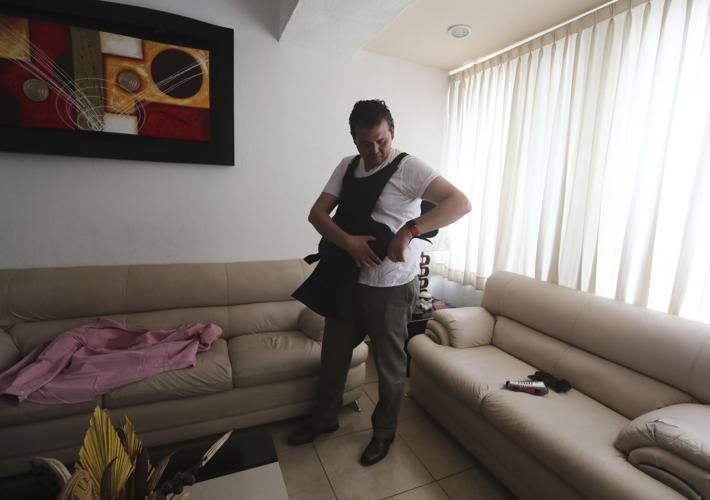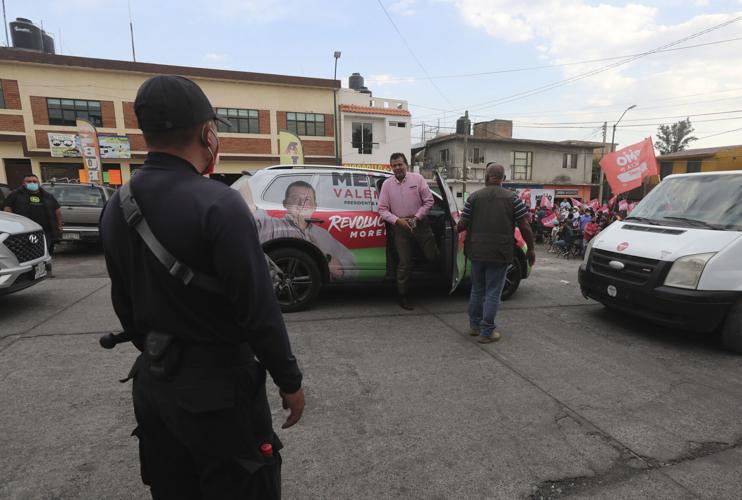When Mexico’s voters cast ballots Sunday, 36 candidates will be missing.
They were killed during the campaign in a wave of electoral violence.
Among them was Abel Murrieta, a former state attorney general who was running for mayor in Ciudad Obregón, Sonora. Gunmen brazenly shot him dead May 13 as he stood on a sidewalk in the afternoon sun, handing out flyers.
His party’s candidate for governor, Ricardo Bours, quickly dropped out of that statewide race, throwing his support to another candidate, Ernesto Gándara, a former Hermosillo mayor representing a three-party alliance. Bours cited his hopes that by electing Gándara, Sonorans may “live without fear, with the peace and prosperity that Sonora deserves.“
Whoever wins, you shouldn’t expect that to happen. It’s unlikely the nationwide elections for local, state and congressional offices on June 6 will alter the downward spiral of violence that has taken hold of parts of Sonora and many other areas of Mexico, experts told me.
In part it’s that, shockingly, candidates aren’t necessarily focused on public safety as a top campaign priority, and to the extent they are, their proposals are tepid. But also, the dynamics of violence are largely beyond the realm of political control. In fact, the killings of candidates show that they are thoroughly enmeshed in this national dynamic.
Mexico’s interior secretary, Olga Sánchez Cordero, perhaps unintentionally made this clear Thursday when she claimed implausibly that most of the killings of candidates did not have an electoral motive.
“They’re reprehensible incidents, their perpetrators must be punished with all the rigor of the law, but as far as we know they don’t have an electoral motive,” she said. “The incidents that have occurred, affecting candidates of all parties, are not related to the electoral process in the vast majority of cases.”
That’s hard to believe, and she didn’t provide evidence to support her conclusion. But either way it’s not good news for Mexico.
Either there’s been an alarming wave of attacks on candidates by people attempting to remove them from the democratic arena, or murder in Mexico is just so common now that naturally three dozen candidates would be killed in the course of election campaigns playing out across the country.
‘Vicious cycle’
Election-related violence is nothing new in Mexico, just more apparent and probably more pervasive in the 2018 and 2021 campaigns.
Violence and threats of it are “intrinsic” to Mexican politics, said Michael Lettieri, a senior fellow for human rights at the University of California-San Diego’s Center for US-Mexican Studies.
In the decades after the Mexican Revolution, the Partido de la Revolución Institucional, or PRI, which ran the country as a single-party state for seven decades, used violence and threats to maintain control, he said.
“The thing that is old is the practice of violence and the impunity around it, but there are new factors that make the violence useful,” he said.
Among those factors is that there is now true political competition in many localities. Criminal and private interests can gain legitimacy and greater access by winning local control through elections.
“You have places where recently you’ve had much more meaningful competition on the electoral level,” Lettieri said. “That then pairs with changes in the nature of organized crime, where it’s become much more predatory and much more focused on things other than drug trafficking. This is extortion of businesses, robberies, local drug dealing, and to a certain extent, preying on the state itself.”
Elections aren’t so much a source of solutions to violence, but more a focal point of violence as power relationships are re-sorted and private and criminal interests seek to maintain their edge. One of the ways they do that is by ensuring that government policies and practices don’t undermine their power, said Falko Ernst, a senior analyst for the Crisis Group.
“They prevent better policies against corruption and collusion and overall in the field of security,” Ernst said. “Were stuck in a vicious cycle.”
Beyond the 36 murdered candidates, an additional 54 politicians who were not candidates have been killed during this electoral process, according to a report by the research firm Etellekt. A total of 782 acts of aggression against candidates have occurred, the report says, including threats and attacks that were not fatal.
About three quarters of the attacks have been on candidates who are members of opposition parties in their states.
Worst month for Sonora killings
The campaign has taken place during a period of violence unrivaled in modern times in the state of Sonora.
Murphy Woodhouse, a former Arizona Daily Star reporter now working as a correspondent for KJZZ’s Fronteras Desk in Hermosillo, reported that April was the worst month for murders in Sonora since the current record-keeping system began in 1997. There were 195 murders reported that month, and the state is on pace to far surpass 2020, previously the most violent year.
Among the worst municipalities have been Caborca in northwestern Sonora and Cajeme, the municipality where Ciudad Obregón is the seat, in southern Sonora.
Yet, the political response to the violence among candidates has been disappointing, said Manuel Emilio Hoyos, of the Sonoran Security Observatory. It’s part of a national network of citizen groups working to reduce violence.
“Unfortunately, we see them treating it like just another issue, not as a priority,” Hoyos said. “We would have expected that the candidates for governor, from the first day of the campaign, would have presented a security platform — that is, an agenda over the short, medium and long terms to reduce insecurity and violence.”
Of course, Mexico’s security strategy is typically dominated by the federal government. To the extent there was a referendum on violence and who should confront it, that happened in 2018, when Andrés Manuel López Obrador was elected president.
His security strategy has largely relied on the deployment of the new National Guard and military to areas of high violence. And the person who carried out the strategy was his original secretary of public safety, Alfonso Durazo.
Now Durazo has left the Cabinet to be the Morena Party candidate for governor of Sonora, his home state. The likelihood that a productive change in policies will come out of the election is small.
“I’m not surprised violence is not a campaign issue because the candidates can’t change it,” Lettieri said, referring to the state and local candidates to be elected Sunday. “Their ability to make things better is limited, and their ability to make things worse is infinite.”
The status quo levels of violence may seem intolerable in parts of Sonora and elsewhere in Mexico, but over the short term it looks like the best-case scenario.







